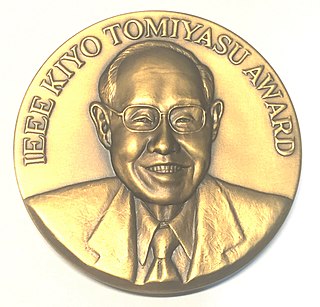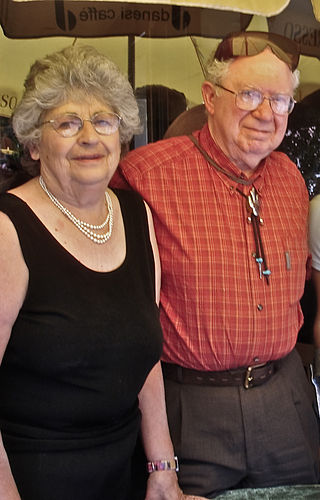Related Research Articles
The IEEE Robert N. Noyce Medal is a science award presented by the IEEE for outstanding contributions to the microelectronics industry. It is given to individuals who have demonstrated contributions in multiple areas including technology development, business development, industry leadership, development of technology policy, and standards development. The medal is named in honour of Robert N. Noyce, the co-founder of Intel Corporation. He was also renowned for his 1959 invention of the integrated circuit. The medal is funded by Intel Corporation and was first awarded in 2000.
The IEEE Jack S. Kilby Signal Processing Medal is presented "for outstanding achievements in signal processing" theory, technology or commerce. The recipients of this award will receive a gold medal, together with a replica in bronze, a certificate and an honorarium.
The IEEE Dennis J. Picard Medal for Radar Technologies and Applications is an award presented for outstanding accomplishments in advancing the fields of radar technologies and their applications. This award can be presented to an individual or group of up to three people.
The IEEE James L. Flanagan Speech and Audio Processing Award is a Technical Field Award presented by the IEEE for an outstanding contribution to the advancement of speech and/or audio signal processing. It may be presented to an individual or a team of up to three people. The award was established by the IEEE Board of Directors in 2002. The award is named after James L. Flanagan, who was a scientist from Bell Labs where he worked on acoustics for many years.
The IEEE Andrew S. Grove Award is a Technical Field Award presented by the IEEE for outstanding contributions to solid-state devices and technology. The award may be presented to an individual or a team of up to three people. It was established by the IEEE Board of Directors in 1999. The award is named in honor of the lifetime achievements of Andrew S. Grove, including helping to found Intel Corporation.
The IEEE Reynold B. Johnson Data Storage Device Technology Award was a Technical Field Award of the IEEE that was established by the IEEE Board of Directors in 2004 and was discontinued in 2011. The award was presented annually from 2006–2010 for outstanding contributions to the advancement of information storage, with an emphasis on technical contributions in computer data storage device technology. The award was named to honor Reynold B. Johnson.
The IEEE Gustav Robert Kirchhoff Award is a Technical Field Award established by the IEEE Board of Directors in 2003. This award is presented for outstanding contributions to the fundamentals of any aspect of electronic circuits and systems that has a long-term significance or impact.
The IEEE Judith A. Resnik Award is a technical field award presented by the Institute of Electrical and Electronics Engineers (IEEE) to either an individual, or a team, "for outstanding contributions to space engineering within the fields of interest of the IEEE".

The IEEE Kiyo Tomiyasu Award is a Technical Field Award established by the IEEE Board of Directors in 2001. It is an institute level award, not a society level award. It is presented for outstanding early to mid-career contributions to technologies holding the promise of innovative applications. The prize is sponsored by Dr. Kiyo Tomiyasu, the IEEE Geoscience and Remote Sensing Society, and the IEEE Microwave Theory and Techniques Society (MTT).
The IEEE Richard M. Emberson Award was established by the IEEE Board of Directors in 1986. It is presented to an IEEE member for distinguished service to the development, viability, advancement, and pursuit of the technical objectives of the IEEE.
The IEEE Donald G. Fink Prize Paper Award was established in 1979 by the board of directors of the Institute of Electrical and Electronics Engineers (IEEE) in honor of Donald G. Fink. He was a past president of the Institute of Radio Engineers (IRE), and the first general manager and executive director of the IEEE. Recipients of this award received a certificate and an honorarium. The award was presented annually since 1981 and discontinued in 2016.

Thelma Estrin was an American computer scientist and engineer who did pioneering work in the fields of expert systems and biomedical engineering. Estrin was one of the first to apply computer technology to healthcare and medical research. In 1954, Estrin helped to design the Weizmann Automatic Computer, or WEIZAC, the first computer in Israel and the Middle East, a moment marked as an IEEE Milestone in Electrical and Computer Engineering. She was professor emerita in the Department of Computer Science, University of California at Los Angeles (UCLA).
The IEEE Biomedical Engineering Award is a Technical Field Award of the IEEE given annually for outstanding contributions to the field of biomedical engineering. It was established in 2010.
In 2002, the Institute of Electrical and Electronics Engineers (IEEE) added a new award to its already existing program of awards. Each year, one or more nominees are honored with a medal in the name of Jun-ichi Nishizawa, considered to be the father of Japanese microelectronics. Nishizawa was professor, director of two research institutes and the 17th president at Tohoku University, Sendai, Japan, and contributed important innovations in the fields of optical communications and semiconductor devices, such as laser and PIN diodes and static induction thyristors for electric power applications.
The Engineering and Technology History Wiki (ETHW) is a MediaWiki-based website dedicated to the history of technology. It started operating in 2015. It consists of articles, first-hand accounts, oral histories, landmarks and milestones.
The IEEE Innovation in Societal Infrastructure Award is a Technical Field Award established by the IEEE Board of Directors in 2011. The IEEE Technical Field Awards are awarded for contributions or leadership in specific fields of interest of the IEEE.
The IEEE Transportation Technologies Award is a technical field award given for advances in technologies within the fields of interest to the IEEE as applied in transportation systems. This IEEE-level award, was created in 2011 by the board of directors of the IEEE and sponsored by the IEEE Industry Applications Society, IEEE Industrial Electronics Society, IEEE Intelligent Transportation Systems Society, IEEE Microwave Theory and Techniques Society, IEEE Power Electronics Society, IEEE Power & Energy Society, IEEE Vehicular Technology Society. The award is given to an individual, a team, or multiple recipients up to three in number.
Bede Liu is a Taiwanese-American engineer. He is a professor emeritus at Princeton University.
The IEEE Computer Science & Undergraduate Teaching Award is a Technical Field Award of the IEEE that was established by the IEEE Computer Society in 1999. It is presented for outstanding contributions to undergraduate computer science education through teaching and service.
Santosh Kurinec is an IEEE fellow and a professor of Electrical & Microelectronic Engineering at Kate Gleason College of Engineering in Rochester Institute of Technology (RIT). She is an Indian American electronic engineer specializing in electronic materials and devices. She is a former IEEE Electron Devices Society distinguished lecturer. In 2018, she was inducted into the Women in Technology International (WITI) Hall of Fame.
References
- ↑ "IEEE IEEE Undergraduate Teaching Award". Ieee.org. Archived from the original on December 10, 2019. Retrieved 10 December 2019.
- ↑ "Award recipients" (PDF). IEEE . Archived from the original (PDF) on December 10, 2019. Retrieved 11 August 2023.
- ↑ "Terri Fiez, former head of engineering and computer science at Oregon State, lands a top post at CU Boulder". Oregonlive.com. 22 June 2015. Retrieved 14 March 2017.
- ↑ "Oregon State mishandled dismissal of Terri Fiez, created 'crisis' in engineering school, tech leaders say". Oregonlive.com. 21 December 2013. Retrieved 14 March 2017.
- ↑ "CSU Faculty Profile Detail - Cleveland State University". Csuohio.edu. Retrieved 14 March 2017.
- ↑ "EDS Members Named Recipients of IEEE Technical Field Awards". IEEE . Archived from the original on February 21, 2014. Retrieved 2018-11-03.
- ↑ "Santosh K. Kurinec - Engineering and Technology History Wiki". Ethw.org. 26 February 2016. Retrieved 14 March 2017.
- ↑ "Raghunath K. Shevgaonkar - Engineering and Technology History Wiki". Ethw.org. 24 February 2016. Retrieved 14 March 2017.
- ↑ "Directory – Electrical and Computer Engineering". Umn.edu. Retrieved 14 March 2017.
- ↑ "Ned Mohan - Engineering and Technology History Wiki". Ethw.org. Retrieved 14 March 2017.
- ↑ "John C. Bean biography". Virginia.edu. Retrieved 14 March 2017.
- ↑ "John C. Bean - Engineering and Technology History Wiki". Ethw.org. February 2016. Retrieved 14 March 2017.
- ↑ "Dr. Haniph A. Latchman". www.list.ufl.edu. Archived from the original on 1 April 2004. Retrieved 13 January 2022.
- ↑ "Innovation Hall of Fame - Michael G. Pecht". Umd.edu. Retrieved 14 March 2017.
- ↑ "J. David Irwin - Engineering and Technology History Wiki". Ethw.org. 29 January 2016. Retrieved 14 March 2017.